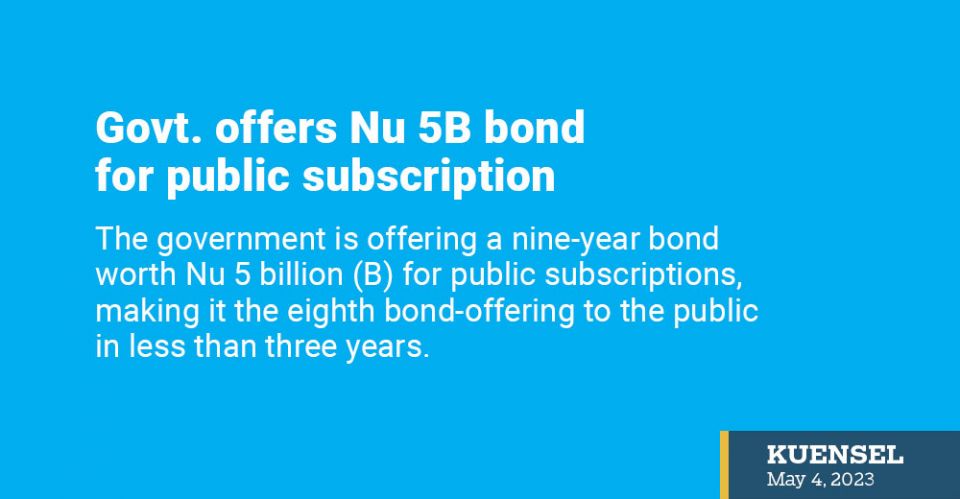
The government is offering a nine-year bond worth Nu 5 billion (B) for public subscriptions, making it the eighth bond-offering to the public in less than three years.
With a maturity period of nine years, the submission of subscription applications opened on April 29 and will close at noon on May 5 this year, to be allocated using a yield-based auction, according to the finance ministry.
A government bond or sovereign bond is a debt obligation issued by the government to support government spending. Since September 2020, the government has raised Nu 14.7B, but it accounts into the country’s domestic debt.
Bonds are also a secure investment option for those looking for a regular return, as the finance ministry pays coupons (intertest) on a half-yearly basis. It generally includes a commitment to pay periodic interest, called coupon payments, and to repay the face value on the maturity date.
For the current bond, the ministry will pay the first coupon on November 9 this year and the second coupon on May 9, 2024 into the bank account that a bondholder has registered for receiving the payment.
However, the annual coupon rate of the bond is to be determined at an auction.
The face value of the bond has been fixed at Nu 1,000 and the minimum subscription amount at Nu 10,000 (10 units) while the maximum limit has not been specified.
The maturity date is May 9, 2032, on which the principal amount and final interest will be paid. Interest earned from the bonds is non-taxable for personal income tax. However, the interest income from the bond is taxable (5 percent as tax deducted at source) for the business income tax and corporate income tax-paying entities.
An official from the finance ministry said that the government offered the bonds as a debt instrument to finance the gap for the projects based on infrastructure development. The government bonds are cheaper and risk-free, he said.
Most of these bonds mature between 2031 and 2034 with an annual coupon (interest) rate between 3 and 6.5 percent.
The official added that with the offering of the bonds, the government is trying to build a vibrant stock exchange market.
He said that Bhutan’s bond market is in its infant stage and the coupon rates are high at about 6 percent. However, the rates should go down, when the market matures in future.
“This will also prepare Bhutan to graduate from the least-developed countries group, where money can be borrowed from the domestic market and money circulating in the economy,” an official said.
Meanwhile, as usual, most of the subscribers for the bond are financial institutions (FIs) because of liquidity with the banks and the opportunity to invest, while individuals are not fully aware of the debt instruments.
Any Bhutanese, firms, companies, corporate bodies, financial institutions and trust funds can subscribe to the bond.
As per Section 126 of the Public Finance Act 2007, the finance ministry can borrow money to finance fiscal budget deficits and refinance maturing debt or a loan paid before the redemption date.
The ministry can also issue bonds to maintain credit balances in the bank accounts, and on lending to State enterprises and other legal entities, or for any other purposes approved by the Cabinet.












